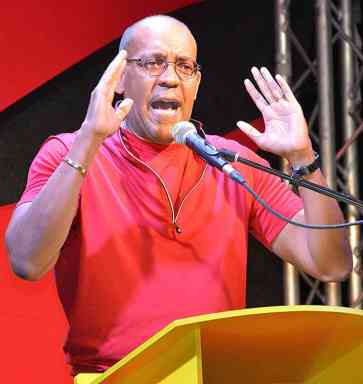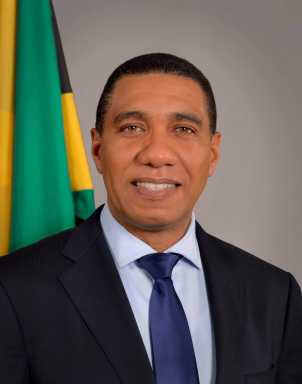Listeners:
Top listeners:
- play_arrow
RadioJLR Just Press Play
Antigua and Barbuda
Antigua and Barbuda recently observed Labor Day, with a senior trade unionist demanding an increase in the national minimum wage. Prime Minister Gaston Browne has pledged to raise the minimum wage and finalize a new collective bargaining agreement by next year.
General Secretary of the Antigua and Barbuda Workers’ Union (ABWU) Senator David Massiah told a labor rally that the national minimum wage should be increased to EC$13.50 per hour, referring to spiralling inflation and the economic strain on working-class families.
“Our cost of living… is choking the working class,” Massiah told the rally, criticizing the government’s failure to act decisively on inflation.
Massiah, an opposition legislator, said the current minimum wage of EC$ $9 per hour was insufficient and outdated.
“They are killing you and telling you that you must work for $9. We say no to that.” Massiah said, calling for the immediate convening of the Minimum Wage Advisory Committee.
Massiah is also calling for creating a severance protection fund, amending the Labor Code, establishing a national health and safety policy, and forming a tripartite committee involving government, employers, and unions to jointly assess the country’s economic challenges.
“We need a government that is ready to do right by the people,” he said.
Prime Minister Browne, speaking at the Labour Day rally, said, “We will accelerate the collective bargaining agreement and agree to an increase no later than next year.
“We will also increase the minimum wage once again, the third time in about ten years, Browne said.
“Without these workers, there will be no ABLP (Antigua and Barbuda Labour Party You don’t have to march against us… all you have to do is say it and it will be done,” Brown declared.
Caribbean
The United Nations Development Programme (UNDP) said that human development progress is experiencing an unprecedented slowdown.
Instead of seeing sustained recovery following the period of exceptional crises of 2020-2021, the report reveals unexpectedly weak progress, adding that this year has the smallest increase since 1990.
The 2025 Human Development Report, “A matter of choice: people and possibilities in the age of Artificial Intelligence (AI),” analyses development progress across a range of indicators known as the Human Development Index (HDI). This index includes achievements in health and education, along with income levels. Projections for 2024 reveal stalled progress on the HDI in all regions worldwide.
According to the UNDP, Antigua and Barbuda led the Caribbean with a ranking of 53 out of 193 countries worldwide and an HDI of 0.851. It was followed by St Kitts-Nevis with a ranking of 58 and an HDI of 0.840. The Bahamas had a ranking of 66 and an HDI of 0.820.
Barbados is ranked number 69 with an HDI of 0.811, followed by Trinidad and Tobago at position 72 with an HDI of 0.807 and St Vincent and the Grenadines at 76 with an HDI of 0.798.
Grenada has a ranking of 80 and an HDI of 0.791, followed by Guyana at 89 with an HDI of 0.776, and Dominica at 98 with an HDI of 0.761. St. Lucia has a ranking of 103 and an HDI of 0.748, while Suriname is ranked at 114 with an HDI of 0.722, followed by Belize with a ranking of 115 and an HDI of 0.721 and Jamaica at 117 with a ranking and an HDI of 0.720.
Haiti is the lowest ranked Caricom country at 166 with an HDI of 0.554.
Grenada
The government of Grenada is planning to remove the death penalty as a punishment for a criminal offence. However, the public will give suggestions and recommendations as part of a consultative process.
Rae Thomas, Crown Counsel, Office of the Attorney General, Ministry of Legal Affairs, Labor and Consumer Affairs, disclosed this.
Grenada is one of 14 states being reviewed by the UPR Working Group.
In response to recommendations from various UN members, including Italy and Mozambique, that Grenada intends to repeal the death penalty as a punishment, without providing a timeline, Thomas told the UPR Working Group that the removal is the government’s intention.
The government intends to initiate public consultation on the potential abolition of the death penalty. Grenada remains open to receiving international support and technical assistance to help facility this important conversation,” she told the group.
Grenada is not a signatory to the Second Optional Protocol to the International Covenant on Civil and Political Rights, which aims to abolish the death penalty.
Haiti
Dozens of protesters marched across Haiti’s capital, demanding an end to persistent gang violence as they called on the prime minister and transitional presidential council to resign.
It’s the latest protest to reflect growing anger and frustration over a surge in violence as gangs try to seize complete control of Port-au-Prince.
“The only thing the Haitian people are asking for is security,” said a 42-year-old bus driver, Eric Jean.
“We’re losing more neighborhoods, more people are dying, more people are fleeing their homes.”
The protest comes a day after hundreds of people gathered in Port-au-Prince to honor several community leaders killed in recent clashes with gangs.
“Freedom or death!” the mourners shouted as the leaders of the Canapé-Vert neighborhood entered a small stadium where the memorial was held.
Videos posted on social media showed the leaders carrying automatic weapons and wearing black T-shirts with pictures of those killed. Many also covered their faces to protect themselves from possible retaliation by gangs. Clad in white, the mourners raised their fists and clutched hands in the air as a man on stage roared in Haitian Creole, “The blood is not going to be shed in vain! The fight is what?”
“Just beginning!” the crowd answered in unison.
Meanwhile, Haiti’s National Police, supported by a UN-backed mission led by Kenyan police, has struggled in its fight against gangs as the mission remains underfunded and understaffed, with only 1,000 personnel of the 2,500 envisioned.
Jamaica
The International Monetary Fund (IMF) says that Jamaica has successfully reduced its public debt over the last decade, firmly anchored inflation and inflation expectations, and strengthened its external position.
“It has built an enviable track record of investing in institutions and prioritizing macroeconomic stability. Jamaica has met recent global shocks and natural disasters in a manner that is agile, prudent, and supportive of growth,” said Mauricio Villafuerte, the Division Chief of the Western Hemisphere Department.
Villafuerte said that gross domestic product (GDP) declined during the financial year 2024/25 due to hurricane Beryl and tropical storm Raphael, which damaged agriculture and infrastructure and undermined tourism.
He said the current account has been in surplus for the last two fiscal years with substantial tourism revenues and high remittances. The position of international reserves has continued to improve.
Villafuerte said the outlook points to growth settling at its potential rate once the financial 2025/26 recovery is complete and inflation stabilising at the BOJ’s target range.
He said a primary surplus is expected for the financial year 2025/26, leading to public debt falling to 65% of GDP by the end of the fiscal year, the lowest level in 25 years and well below pre-pandemic levels.
St. Vincent and The Grenadines
Prime Minister Dr. Ralph Gonsalves says families that decide to foster children in St. Vincent and the Grenadines receive from EC$200 to EC$275 per month, about the same amount that the country’s poorest receive through public assistance.
Gonsalves told Parliament that there is a case for increasing the amount of money going to foster parents, and “we are undertaking to increase the number.
“That is a discussion we had when we were preparing the budget, and it didn’t get inside. But that is something which, personally, I think we need to give more than the EC$275, and we have to find a number.”
Gonsalves was responding to a request from opposition legislator, Shevern John, for a date on the monthly assistance given to foster parents over the past two years and whether an increase would be given, in light of the rising cost of living.
John also asked for an update on the problems the Ministry of National Mobilization experiences with foster care retention and on the criteria for returning foster care children to their original families.
Gonsalves, responding on behalf of the Minister of National Mobilization, Social Development, Family and Gender Affairs, said the ministry provides three categories of care for children in need, each designed to address the varying circumstances and needs of children within the foster care system.
He said the government gives kin-ship caregivers a monthly stipend of EC$200, and EC$275 is given to those in institutional or foster care.
Compiled by Devika Ragoonanan
Written by: Adm
Similar posts
© 2025. All Rights Reserved by Radio-JLR



